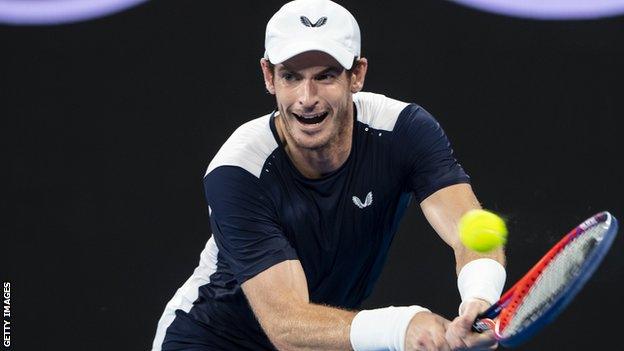Australian Open 2021: Andy Murray's hopes of playing in tournament over
- Published

Andy Murray last played at the Australian Open in 2019 - which he thought might have been his final match as a professional
Five-time finalist Andy Murray will miss the Australian Open after a solution to find a "workable quarantine" following his positive test for coronavirus could not be found.
The 33-year-old Briton was set to fly out to Melbourne last week, but was not allowed to travel on a charter flight after being found to have Covid-19.
The former world number one had hoped to travel safely and compete as planned on the back of a negative test.
Murray said he was "gutted" not to go.
He was asymptomatic and is now out of self-isolation, but finding a way for him to travel to Australia and then going into quarantine before the tournament starts on 8 February proved too difficult.
"We've been in constant dialogue with Tennis Australia to try and find a solution which would allow some form of workable quarantine, but we couldn't make it work," said Murray.
"I want to thank everyone there for their efforts. I'm devastated not to be playing out in Australia. It's a country and tournament that I love."
Murray was able to play only seven official matches in 2020 because of a lingering pelvic injury, and the five-month suspension of the tours because of the pandemic.
At 123rd in the world, he was ranked too low to gain direct entry into Australian Open so the three-time Grand Slam champion was given a wildcard.
The Australian Open at Melbourne Park is starting three weeks later than usual because of the coronavirus pandemic.
Players had to test negative before taking one of the 15 chartered flights - which were put on last week by tournament organisers and operated at 25% capacity - to Australia.
On arrival, the players and their support staff went straight into a 14-day quarantine under the conditions imposed by the Australian government.
That agreement allowed them out of their rooms for up to five hours a day for food and practice.
However, 72 players have been confined to their rooms in a tougher quarantine - which led to some complaints and creative ways of staying fit - after they travelled on three flights where positive cases were found on arrival.
Competitors in the Australian Open are having to practise in different circumstances this year
Analysis
BBC tennis correspondent Russell Fuller
Having missed his flight to Melbourne, and therefore last weekend's window for the players to begin 14 days of quarantine, Murray was always up against it.
There are no health issues, and no injury concerns, and Murray had been hoping he could make it to Australia to complete quarantine in time to play a first-round match on either 8 or 9 February.
But the only "workable quarantine" would have included five hours out of his room every day. This was no longer available, and no player - irrespective of age or injury history - would want to play a Grand Slam first-round match just hours after two weeks in a hotel room.
Murray is understandably devastated: he knows that at 33, and with two hip operations behind him, he cannot guarantee there will be another opportunity.
But it would have been a long way to travel potentially to lose in the first round, and receiving a special exemption may not have sat well with Murray over time.
Instead, he will work with his team on his next move. Montpellier and Rotterdam are the next two ATP tournaments in Europe, although nothing is easy with Covid travel restrictions.

You can stream five fourth-round games live on the BBC this weekend, including Liverpool's trip to Manchester United. Find out more here.
